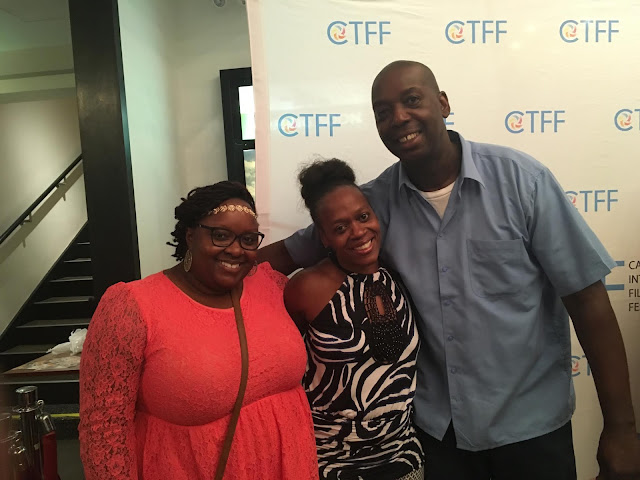By Neil Armstrong
I’m thankful that I spent much of yesterday (Sunday, Dec.
23) celebrating the 50th birthday of my friend, Karen Flynn. I’ve
known her since 1995 when we met at York University where she was pursuing her
postgraduate studies and working at CHRY Radio too. We’ve maintained our
friendship over the years, even as she lives in the United States with her
family. Karen is an associate professor in the Department of Gender and
Women’s Studies and the Department of African-American Studies Program at the
University of Illinois, Urbana-Champaign. Responding to well wishes, Karen
reminded us that tomorrow is promised to no one and so we should value the
family and friends in our lives and keep in touch with them. [I'm looking forward to our visit of a friend who is in her mid-90s this week.]
That sentiment was expressed at the funeral of Joyce Eulalee
Ricketts, 82, that I attended in Brampton on Saturday. My condolences to her
daughter, Diane; son, Franklin; grandchildren, brothers, sister and other
relatives and friends. Last Monday, an event that I went to in celebration of
the life of Carl Edmonson at The 519 in downtown Toronto ended with Dionne
Warwick’s 1985 song “That’s What Friends Are For.” Carl worked with PACE Canada
[Project for the Advancement of Childhood Education] in an administrative role
and volunteered at The 519. He was also a teacher looking forward to working in
the Toronto District School Board. My condolences to his family and friends,
and also to the family and friends of actor and producer, Gloria Surage.
Celebrating family and friends is important to me, and today
(Dec. 24) – my birthday – I’m using this space to celebrate life and
friendships captured in these photos. Some of these friendships go as far back
as when we were 7 or eight years old living next door to each other. Some are
later and span over 20 years, and others are more recent. Thanking God for
health and the ability to love and demonstrate caring for others.
 |
| Hanging out with my childhood friend, Shaun, in her backyard in Jamaica. |
 |
| My friend, Paul, and I decided to dress up for this event. |
 |
| Karen Flynn's 50th birthday celebration, Part 2, yesterday at Broadview Lofts. |
 |
| Gina and Karen. I reminded everyone that we travelled to Jamaica years ago and had lots of fun. |
 |
| Sherldine (Dianne), Karen and Karen |
 |
| Hanging out at my place with Paul, Keith, Kevin, Shavaun, Nigel, Alistair and Gary. |
 |
| With high school friends, Hyacinth and Merrick, at an event featuring author, Marlon James, at the Toronto Reference LIbrary. |
 |
| With Richard, Michael, Trevor and Steve at Zun Lee's exhibition at the Gladstone Hotel. |
 |
| Jean-Paul and Jasminee at the opening night of the CaribbeanTales International Film Festival on College Street, Toronto. |
 |
| Nikki, Karen and Clive at the opening night of the CaribbeanTales International Film Festival. |
 |
| Claire and I went to the same high school. |
 |
| After her performance at the Wolmer's Alumni Association Toronto concert, Belinda and I had this one taken. |
I’m always aware that I’m part of a village and so I’ll
continue to spread the word and support those who are working on various
progressive projects and in various businesses in the Black community.
Here are a few:
Anne-Marie Woods’ “Jazzetry – A Night of Spoken Word,
Vocalists and Live Music (Jan. 12)
Robert Ball’s new single “River” released recently
Andre Rose’s underwear brand “Steele” – his book will be
published in 2019
Nadia L. Hohn’s new book “Harriet Tubman: Freedom Fighter on
Jan. 22 at A Different Booklist
Trey Anthony’s show “OH NO! I’m becoming
my mother and other fears of black women” during KUUMBA at the
Harboufront Centre during Black History Month
Kevin Ormsby’s KasheDance performances
Jermaine Cowie, performer of Miss Lou’s poems
Ontario Black History Society
Black Coalition for AIDS Prevention
A Different Booklist
Knowledge Bookstore
The Diner’s Corner
ByBlacks.com
Black Business and Professional Association
United Achievers’ Club
Jamaican Canadian Association
PACE Canada
 |
| With Karen, Sailaja and Saira outside Ryerson University. |
 |
| Celebrating my birthday with me at The Diner's Corner in 2017 were from left-right: Gary, Kevin, Jean-Paul, Frank, Chanel, Trevor, Paulton and Richard. |
 |
| Hanging with these dynamic and creative friends, Pulga, Kevin, Aina-Nia and Debbie. |
 |
| Sarah, Emily, Robert and Amani at the National Black Canadians Summit at the Toronto Reference Library in December 2017. |
 |
| Kevin and Trevor have the same birthday so we celebrated at an exhibition at the Royal Ontario Museum before moving on to a home celebration. |
 |
| Courtnay, Zun and I at Roger McTair's book launch at the Theatre Centre |
 |
| With authors Itah Sadu, Sharon Draper and Nadia L. Hohn at A Different Booklist |
 |
| Dylan showing off his work to his mom, Camille, and grandmother, Cecile, at OCAD University |
 |
| They are gone but not forgotten. Remembering Maud Fuller and Rex Nettleford. |
 |
| They are cousins and both are creative -- Kevin and Jermaine inside Miss Lou's Room at the Harboutfront Centre. |
 |
| Sandra, Robin and Miguel at an anniversary celebration for A Different Booklist at the United Steelworkers Hall in Toronto. |
 |
| We had to don masks at the Coalition of Black Trade Unionists gala so this was the one I chose-:) |
Thank you for the great feedback you've shared after reading stories on my blog. There are many more to come in 2019.
Merry Christmas, Happy Kwanzaa, Happy Holidays! Wishing you a successful new year!










